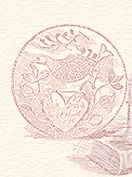Ihr liewe Leit:
Ya, die PD hen der Piewie gut gegliche, awwer sie hen gewiss die
Amschle aa geliebt. Wie der Parre Isaab Stahr (1845-1930) mol gschriwwe hot:
Die Amschel heert mer aa mit Luscht,
Sie singt ihr Lied aus voller Bruscht:
Sie waar lang fatt im waarme Land,
Doc hiss die besser do bekannt.
Un der Salli Holsbock (der Harvey Miller, 1871-1939) waar aa froh,
die Amschle widder zu sehne:
Groos Willkumm, mei Friend! Was binnich so froh
Ass du, die aerscht Amschel, bischt nochemol do!
Ich geb der en Bett un die koscht noch dezu,
Des duhnich gans gaern fer Kumraade wie du.
So verloss dich druff, ich schteh der bei;
Mei Scheier iss gut un warm, kumm rei!
Ich geb der’n Bett in meim beschde Schtroh.
Un Koscht geht mit, so blieb graad do!
Der J. Max Hark (1849-1930) hot aa mol en Gedicht vun der Amschel
gschriwwe, un do sin en paar Vaerscht:
Die Amschle sin do! Die Amschle sin do!
Ich hab die aerscht gheert heit marrige im Bett.
Sie hot gsunge im Gaarde ass waer sie so froh:
“Kumm aan! Kumm ‘hett!
Kumm aan! Kumm ‘hett!
‘S iss die heechschdi Zeit ass mer sich pare duht,
Un sucht sich fer’n Nescht en Baam ass eem suut!
"Kumm aan! Kumm ‘hett!
Kumm aan! Kumm ‘hett!
Was laut’s doch so schee im Marrige so frieh –
En schenneri Musick winsch ich mir net –
Wann sie schwingt uffem Gibbel un singt vor sich hie:
“Kumm aan! Kumm ‘hett!
Kumm aan! Kumm ‘hett!
Ferwas leischt un schloofscht wann die nacht iss verbei?
Die Welt’s yo nie schenner ass im aerscht Sunneschei!
“Kumm aan! Kumm ‘hett!
Kumm aan! Kumm ‘hett!
Nix duh teem so Leed ass wann sie Schpotyaahr
Fatt gehn, un mer sehnt sie der gans Winder net.
Awwer sie duhn ‘s net meinde, sie singe zuvor:
“Kumm aan! Kumm ‘hett!
Kumm aan! Kumm ‘hett!
In en annres Land nau misse mer geh!
So saagt Farriwell un exschpect’s Widderseh!
“Kumm aan! Kumm ‘hett!
Kumm aan! Kumm ‘hett!
Macht’s gut,
Der Alt Professer
|
Dear people:
Yes, the PGs liked the Phoebe/Pewee, but they certainly loved the
robin, too. As Pastor Isaac Stahr (1845-1930) once wrote:
One listens to the robin with joy,
It sings its song from a full breast;
It was gone a long time in a warm land,
But it is much better known here.
And Solly Hulsbuck,
(Harvey Miller 1871-1939) was also glad to see the robins again:
A great welcome, my friend! How happy I am
That you, the first robin, are here again!
I’ll give you a bed and board along with it,
I would like to do that for a comrade like you.
So depend on it, I’ll stick by you;
My barn is good and warm, come in!
I’ll give you a bed in my best straw,
And board to go with it, so stay right here!
J. Max Hark (1849-1930) also once wrote a poem about the robin, and
here are a few verses:
The robins are here! The robins are here!
I heard the first this morning in bed.
It sang in the garden as if it were happy:
“Come on! Come ahead!
Come on! Come ahead!
It’s high time that we begin to pair off,
And look for a nest a tree that suits us!
“Come on! Come ahead!
Come on! Come ahead!
Ho nice it sounds in the morning so early –
I wouldn’t wish for nicer music –
When it swings in the tree-top to itself:
“Come on! Come ahead!
Come on! Come ahead!
Why are you abed and sleeping when night is over?
The world is never nicer than in the first sunshine!
“Come on! Come ahead!
Come on! Come ahead!
Nothing makes one so sad that when in the fall they
Go away, and one doesn’t see them the whole winter.
But they don’t mind, the sing beforehand:
“Come on! Come ahead!
Come on! Come ahead!
We must no go to another land!
So say farewell and expect to see us again!
“Come on! Come ahead!
Come on! Come ahead!
Take care,
The Old Professor
|













